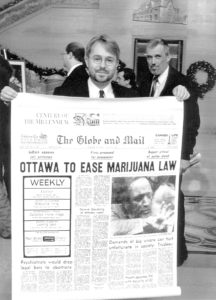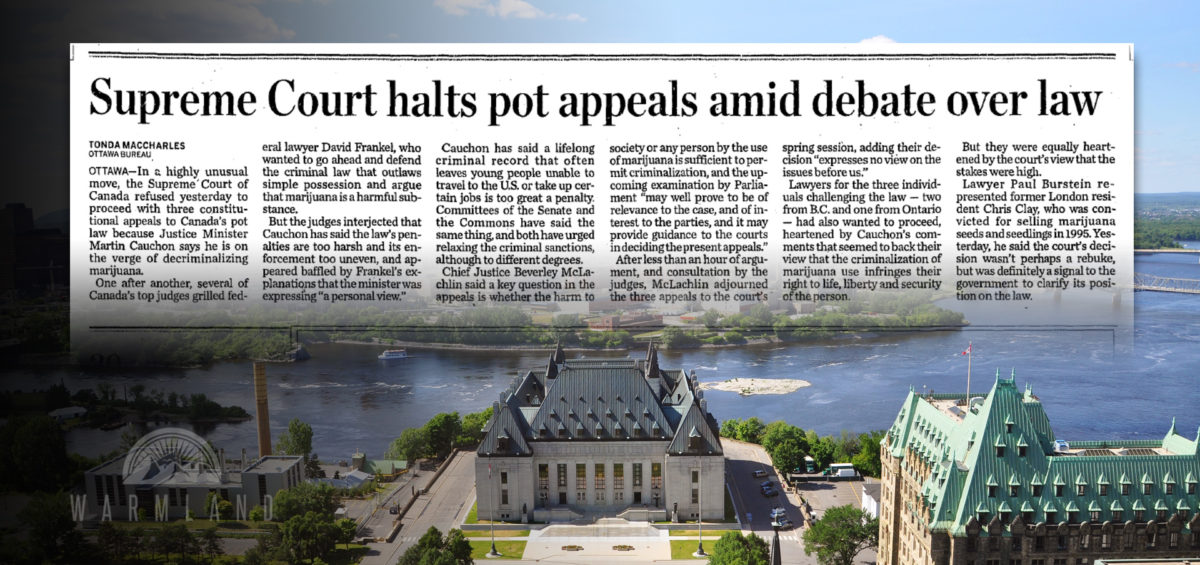
“Christopher Clay paraded in the hall of the Supreme Court with a giant poster of the front page of the Globe and Mail of June 20, 1970. ‘Ottawa to ease marijuana law’, headlined the article. Thirty-two years later, Clay is still waiting.” (Le Devoir, December 16, 2002)
Since 1970, Liberal governments in Canada under Pierre Trudeau, Jean Chretien and now Justin Trudeau have made countless promises to ease the cannabis laws. Each time, the public was told to be patient while the details were being worked out and, each time, legal confusion ensued as hundreds of thousands of Canadians continued to “acquire criminal records under the terms of a law they’ve been told all along should be changed.”
The Liberals’ ongoing cognitive dissonance – that (1) failing to update the laws “would be totally irresponsible” while (2) arrests must continue because “the law is the law” – collided in ridiculous fashion in 2002, when the Supreme Court of Canada was set to hear three constitutional challenges to the cannabis laws (including my own).
As reported in the Toronto Star,
“In a highly unusual move, the Supreme Court of Canada refused yesterday to proceed with three constitutional appeals to Canada’s pot law because Justice Minister Martin Cauchon says he is on the verge of decriminalizing marijuana.”
According to Minister Cauchon, “the law’s penalties are too harsh and its enforcement too uneven… A lifelong criminal record that often leaves young people unable to travel to the U.S. or take up certain jobs is too great a penalty.”
With this in mind, the Supreme Court justices found themselves “baffled” as the federal lawyer, David Frankel, began the proceedings with a defence of prohibition:
“One after another, several of Canada’s top judges grilled federal lawyer David Frankel, who wanted to go ahead and defend the criminal law that outlaws simple possession and argue that marijuana is a harmful substance.”
After less than an hour, the court tired of Frankel’s shenanigans and postponed the hearings until spring to see if the Liberals would finally act.
In the end, the Supreme Court refused to strike down the legislation. As before, the promised decriminalization never came… And, as before, the arrests continued.
Supreme Court halts pot appeals amid debate over law
Toronto Star, December 14, 2002
By Tonda MacCharles, Ottawa Bureau
OTTAWA – In a highly unusual move, the Supreme Court of Canada refused yesterday to proceed with three constitutional appeals to Canada’s pot law because Justice Minister Martin Cauchon says he is on the verge of decriminalizing marijuana.
One after another, several of Canada’s top judges grilled federal lawyer David Frankel, who wanted to go ahead and defend the criminal law that outlaws simple possession and argue that marijuana is a harmful substance.
But the judges interjected that Cauchon has said the law’s penalties are too harsh and its enforcement too uneven, and appeared baffled by Frankel’s explanations that the minister was expressing “a personal view.”
Cauchon has said a lifelong criminal record that often leaves young people unable to travel to the U.S. or take up certain jobs is too great a penalty. Committees of the Senate and the Commons have said the same thing, and both have urged relaxing the criminal sanctions, although to different degrees.
Chief Justice Beverly McLachlin said a key question in the appeals is whether the harm to society or any person by the use of marijuana is sufficient to permit criminalization, and the upcoming examination by Parliament “may well prove to be of relevance to the case, and it may provide guidance to the courts in deciding the present appeals.”
After less than an hour of argument, and consultation by the judges, McLachlin adjourned the three appeals to the court’s spring session, adding their decision “expresses no view on the issues before us.”
Lawyers for the three individuals challenging the law – two from B.C. and one from Ontario – had also wanted to proceed, heartened by Cauchon’s comments that seemed to back their view that the criminalization of marijuana use infringes their right to life, liberty and security of the person.
But they were equally heartened by the court’s view that the stakes were high.
Lawyer Paul Burstein represented former London resident Chris Clay, who was convicted for selling marijuana seeds and seedlings in 1995. Yesterday, he said the court’s decision wasn’t perhaps a rebuke, but was definitely a signal to the government to clarify its position on the law.



